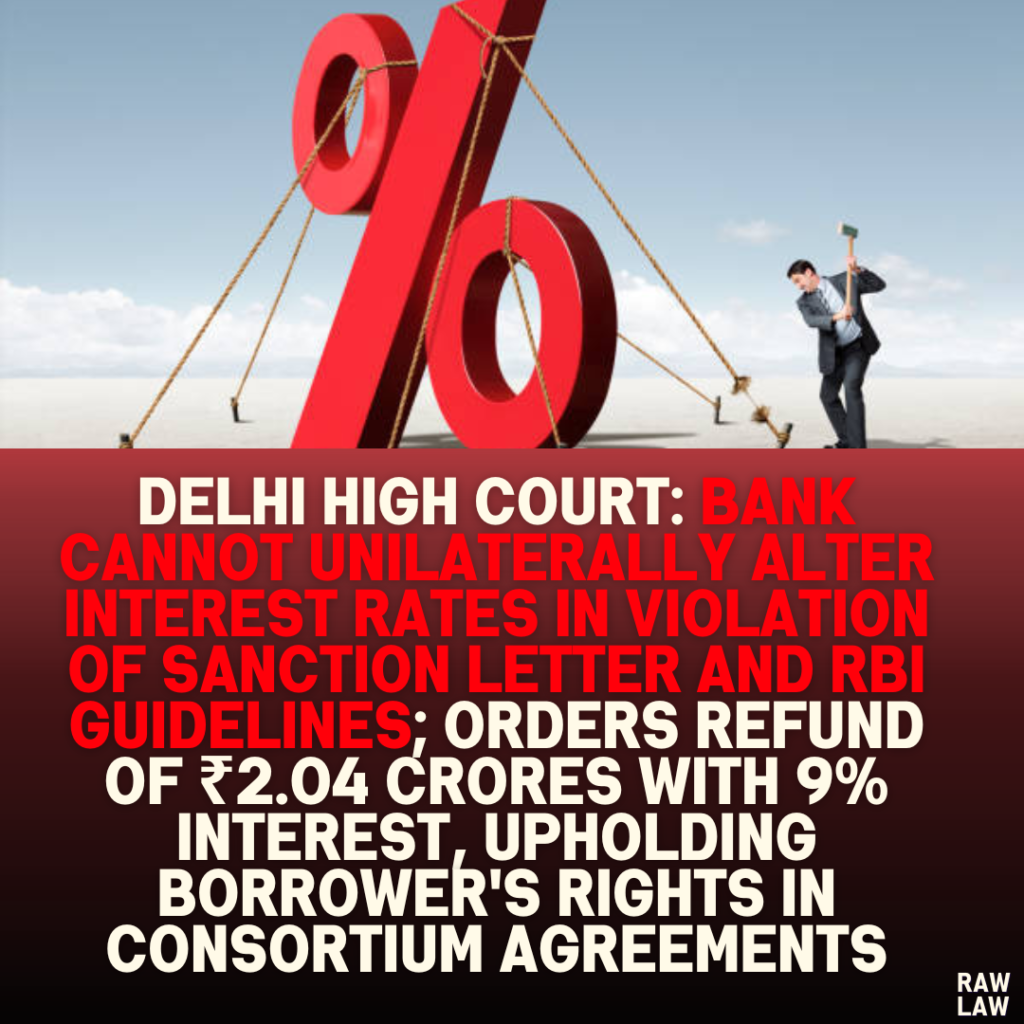Court’s Decision:
The Delhi High Court decreed that the plaintiff is entitled to recover ₹2,04,30,669/- along with interest at 9% per annum from the date of filing the suit until full realization. The court held that the defendant bank’s unilateral change in the agreed interest rate, without the plaintiff’s consent, was contrary to the sanction letter terms and RBI guidelines. The court found the defendant liable for overcharging interest.
Facts:
- The plaintiff, a construction company, sought financial assistance to purchase a commercial property (Magnum Mall).
- A consortium of three banks—Indian Overseas Bank (IOB), Punjab National Bank (PNB), and the defendant—agreed to collectively provide ₹130 crores. The defendant bank’s share was ₹25 crores, sanctioned through a letter dated 26.10.2006.
- The sanction letter specified the interest rate as BPLR (Benchmark Prime Lending Rate) – 1.25% or as charged by other consortium banks, whichever was higher.
- In 2010, the RBI introduced the Base Rate system to replace the BPLR system. This new system applied only to new loans or loans renewed post-2010, as per RBI guidelines.
- The defendant bank unilaterally transitioned the plaintiff’s loan to the Base Rate system, increasing the interest rate without the plaintiff’s consent.
- The plaintiff protested through multiple letters, asserting that the bank’s actions were unilateral, arbitrary, and contrary to the terms of the sanction letter.
- Despite these objections, the bank continued to charge the higher interest rate until the plaintiff repaid the loan in full on 25.07.2012.
Issues:
- Was the plaintiff entitled to recover the excess interest of ₹2,24,89,361/- and associated interest?
- Did the plaintiff file the suit through a duly authorized representative?
- What relief should be granted to the plaintiff?
Petitioner’s Arguments:
- Unilateral Alteration: The defendant bank’s unilateral transition to the Base Rate system violated the agreed terms of the 2006 sanction letter and RBI guidelines.
- No Consent: The plaintiff never consented to the interest rate changes. Letters and communications showed continuous objections to the revised rates.
- Consortium Agreement: Other consortium banks (IOB and PNB) refunded excess interest to the plaintiff. The defendant bank, however, failed to follow suit, despite being part of the same consortium arrangement.
- RBI Guidelines: As per RBI circulars (dated 09.04.2010 and 01.07.2010), existing loans under the BPLR system could only be transitioned to the Base Rate system with the borrower’s consent.
- Calculation Errors: The plaintiff argued that excess interest charged between 09.12.2010 and 25.07.2012 amounted to ₹1,73,14,127, with further damages for the period prior to 2010.
Respondent’s Arguments:
- RBI Compliance: The defendant contended that the change in interest rate was mandated by RBI circulars.
- Floating Rate Clause: The sanction letter allowed for floating interest rates, and the bank was not required to seek explicit consent for such changes.
- Voluntary Repayment: The plaintiff voluntarily closed the loan account in 2012, indicating acceptance of the interest rates.
- No Refund Obligation: The defendant argued that actions by other consortium banks (like PNB) had no bearing on its independent terms and conditions.
Analysis of the Law:
- RBI Circulars:
- The RBI mandated the Base Rate system from 01.07.2010 for new loans and those coming up for renewal.
- Existing loans under the BPLR system could continue under original terms unless borrowers opted for a transition, which required mutual agreement.
- The court found the defendant in violation of these guidelines by unilaterally applying the Base Rate system to an existing loan without consent.
- Sanction Letter:
- The letter stipulated BPLR – 1.25% or as charged by other consortium banks, whichever was higher.
- The unilateral change contradicted these terms, which explicitly required parity with consortium rates.
- Evidence of Protest:
- Multiple communications from the plaintiff to the defendant demonstrated consistent objections to the interest rate hike.
- The defendant failed to justify the unilateral decision as neither the sanction letter nor the RBI circulars supported such action.
Precedent Analysis:
The court underscored the need for banks to adhere to agreed contractual terms and regulatory frameworks. Arbitrary deviations, particularly in multi-banking arrangements, undermine borrower trust and legal principles of fairness.
Court’s Reasoning:
- Unilateral Decision:
- The court highlighted that the defendant’s use of “reviewal” instead of “renewal” in correspondence indicated an arbitrary action not supported by the contract.
- Lack of Consent:
- The plaintiff’s lack of consent to the revised terms was evident in its numerous objections and refusal to switch to the Base Rate system.
- Evidence Against the Defendant:
- The defendant did not lead any evidence to counter the plaintiff’s claims or prove that the plaintiff had consented to the changes.
- Comparative Consortium Actions:
- Other consortium banks adhered to the agreed terms and refunded excess interest, further exposing the defendant’s non-compliance.
Conclusion:
- The court found that the defendant’s unilateral change to the interest rate violated the sanction letter and RBI circulars.
- The plaintiff was entitled to recover ₹1,73,14,127 for the excess interest charged post-2010 and ₹31,16,542 as interest (at 9% per annum) for the two-year delay in refunding the excess amount.
- The court dismissed the defendant’s arguments on voluntary repayment, as the plaintiff’s protest was clear and consistent.
Implications:
- The ruling reinforces the obligation of banks to comply with contractual terms and regulatory guidelines, particularly in consortium arrangements.
- It ensures transparency in banking practices and safeguards borrowers from arbitrary actions.




Pingback: Bombay High Court Dismisses Fraudulent Property Suit: Plaintiff Fails to Prove Ancestral Ownership, Misuses Jurisdiction, and Penalized ₹25,000 - Raw Law